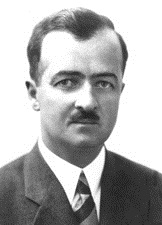C. Douglass Buck
Clayton Douglass Buck (born March 21, 1890 in New Castle , Delaware ; † January 27, 1965 ibid) was an American politician and governor of the state of Delaware from 1929 to 1937 . Between 1943 and 1949 he represented his state in the US Senate .
Early years and advancement
Douglass Buck, as he was called, was the great-great-nephew of John Middleton Clayton , who represented the State of Delaware in the US Senate between 1829 and 1836. Buck attended Friends School and the University of Pennsylvania , where he studied engineering. In 1916 he became the head of the Highway Department in New York State . He then took part in the First World War as a simple soldier . Between 1922 and 1929 he was head of the Delaware Roads Department.
Delaware Governor
Douglass Buck was a member of the Republican Party . Until 1928 he had hardly appeared politically. That year, however, as his party's candidate , he was elected governor of his state with 61% of the vote against Charles M. Wharton, the candidate of the Democratic Party . He took up his new office on January 15, 1929. In 1932 he was elected to the office of electorate as the first governor of Delaware under the constitution in force since 1897. This time he got 54% of the vote, while his Democratic rival Landreth L. Layton got 45%. This election was remarkable in that the election of that time in the United States was won by the Democrats almost everywhere. The high point of this development was the election of Franklin D. Roosevelt as the new President.
Almost the entire eight-year tenure of Douglass Buck was overshadowed by the Great Depression, which also left its mark on Delaware. As a countermeasure, the governor called the legislature for a special session in November 1932. A $ 2 million aid program was passed there. Other programs followed later, as well as the Federal Government's New Deal , with which the crisis was gradually overcome in the further course of the 1930s. Until then, many citizens and employees in the public sector had to accept pay cuts. Many others became unemployed. Also in 1932, the 21st Amendment to the Constitution , the repeal of Prohibition , was ratified. During his governor's tenure, he was also a member of the Republican National Committee from 1930 to 1937 . After his term of office, Douglass Buck resigned on January 19, 1937 from his office.
Buck in the US Senate
In 1942 he was elected as Class 2 Senator to succeed James H. Hughes with 54% of the vote against the Democrat E. Ennals Berl . He represented his state between January 3, 1943 and January 3, 1949 in the US Congress . There he was chairman of the committee that dealt with the District of Columbia . In 1948 he ran for re-election, but lost 48% to 51% of the vote to the Democrat Joseph Allen Frear .
Another résumé
Between 1953 and 1957, Buck was the tax commissioner for the state of Delaware. He then retired from politics, but remained active in business. In the meantime he was also involved in the banking business. He died in January 1965 and was buried in New Castle. Douglass Buck had two children with his wife Alice du Pont, the daughter of US Senator Thomas Coleman du Pont .
literature
- Robert Sobel and John Raimo (Eds.): Biographical Directory of the Governors of the United States, 1789–1978. Volume 1, Meckler Books, Westport, 1978. 4 volumes.
Web links
- Buck in the National Governors Association (English)
- The governors of Delaware (English)
- C. Douglass Buck in the Biographical Directory of the United States Congress (English)
- Douglass C. Buck in the database of Find a Grave (English)
| personal data | |
|---|---|
| SURNAME | Buck, C. Douglass |
| ALTERNATIVE NAMES | Buck, Clayton Douglass (full name) |
| BRIEF DESCRIPTION | American politician |
| DATE OF BIRTH | March 21, 1890 |
| PLACE OF BIRTH | at New Castle , Delaware |
| DATE OF DEATH | January 27, 1965 |
| Place of death | at New Castle , Delaware |


